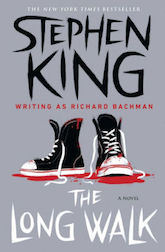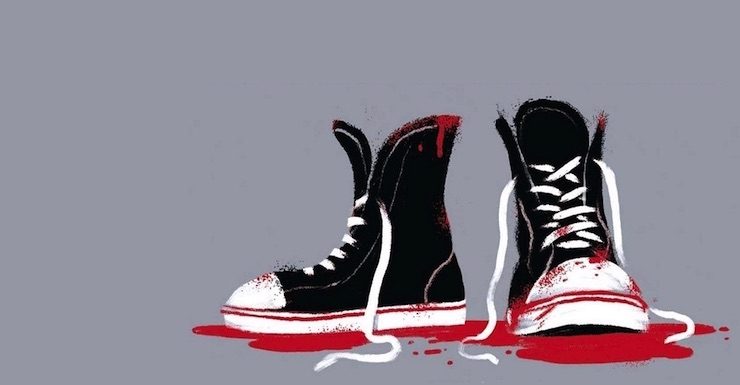Even though Stephen King has been a fixture of popular culture in the West since before I was born, I somehow still went thirty years before reading any of his books. He’s a renowned master of horror—penning the likes of Carrie, The Shining, IT, and Misery to name just a few—but it was his vision of a dystopian future America that first grabbed my attention: The Long Walk.
Originally published under the pseudonym Richard Bachman, The Long Walk features a grueling contest that will see only one survivor. In this way it’s akin to Koushun Takami’s Battle Royale or Suzanne Collins’ The Hunger Games, but in The Long Walk, there’s no real physical contact or violence—instead it’s exactly what it says on the tin: a long walk, a test of pure will and sheer endurance. And it’s this simplicity that grabbed me the first time I read The Long Walk. There’s no real backstory, political machinations, or steadily brewing revolution, just a hundred teenagers walking until all but one of them dies.
Buy the Book


The Long Walk
On the first of May each year, one hundred teenage boys from all across America arrive in northeast Maine to compete in the Long Walk. For the winner: a life of luxury. For the ninety-nine losers: death on the road while America watches from the sidelines, literally and figuratively. In the hands of most other authors, this might make for an interesting short story, but King turns this simple premise into a novel that is utterly enthralling despite—or perhaps because of—its simplicity.
There is no lottery to choose the Walkers, nobody forces the boys to walk, and throughout the book you’ll see teenagers who aren’t even sure why they chose to partake in what is essentially a death march. Whether it’s that directionless malaise common to adolescence, a subconscious death wish, or simply partaking in the ultimate dare, few of the boys have any sort of reason—let alone a good one—for competing in the Long Walk. Katniss Everdeen knows exactly why she’s in the Hunger Games arena, and she’s a compelling protagonist—the fact that Ray Garraty can be a captivating character without much in the way of purpose speaks to Stephen King’s skill as a writer, and his ability to flesh out the interior spaces of his characters.
On the surface, the only significant thing about Garraty, the only thing that sets him apart from the other Walkers, is that he’s “Maine’s Own.” While the race brings competitors from all over, it rarely makes it into out of Maine and into New Hampshire, and only once before has the Walk ever reached Massachusetts. This makes Garraty a favourite of the locals who come out to watch the Walkers—particularly the ones who have money riding on the outcome. Besides that, he’s largely a cypher, examining the boys around him as their bodies and minds break apart and collapse on the road. Through his eyes we get to know McVries, Olson, Barkovitch, Stebbins, and the man who runs the entire contest who is known only as The Major.
Peter McVries is the closest thing Garraty has in the Walk to a friend—the scar-faced kid eventually coming to terms with the suicidal tendencies that pushed him into the competition. Hank Olson starts the race as a strong, eager competitor, but exhaustion hollows him out until he’s little more than an ambling husk. Gary Barkovitch is the villain of the piece, so vaudevillian in his vehement hatred of the other Walkers that you can’t help but be grossly entertained.
At the start of the Walk, and the book, The Major is viewed by the boys as almost a heroic figure, an imposing man dressed in fatigues, who never removes his sunglasses. But whatever respect and hero worship the boys have for him quickly diminishes with every mile they spend on the road.
Only ever referred to by his surname, Stebbins is the Walk’s dark horse. Bitter, morose, and skinny, Garraty picks him out for the Most Likely To Die First Award, but Stebbins has a greater purpose to the Walk than perhaps any of the others. The bastard son of The Major, Stebbins plans to win the Long Walk and be given his proper place at the Major’s side. And whilst this purpose may push Stebbins further than most of the others, his secret weapon isn’t such a secret after all. We’re left wondering how far The Major will go—and just who he is willing to sacrifice—to make the year’s Long Walk a success.
And this is part of the reason why the book shines: the unanswered questions. What is it about life in this dystopian America that makes adolescents choose this fate? What Prize could ever be worth that suffering? What is the self-destructive urge that drives these characters (and maybe ourselves)? What does it say about a nation’s psyche if such a grotesque carnival of slow horrific death becomes a national pastime? And how far off from that are we now with reality TV, murders live broadcast on social media, and a 24-hour news cycle that celebrates death, carnage, and bigotry?
The Long Walk is slow but enthralling, putting you right there on the road beside these boys, knowingly walking themselves to death. You watch as they come apart at the seams one step at a time, their own particular neuroses coming to the forefront just long enough to leave an impression and—more than likely—kill them.
Depending on how and where your adolescent years were spent, The Long Walk might be of limited interest, and there are a couple of instances where King uses language that, let’s say, hasn’t aged well. However, King expertly captures the horrors of the Walk, and the juvenile preoccupations of the adolescent—not only their fears and desires, but also the vapid philosophical and intellectual musings which seem so deeply important at the time, because hormones make everything feel like life or death, make every schoolyard crush feel like love eternal, and make every heartbreak leave you contemplating self-harm (or writing teen-angst poetry). The Long Walk is a fascinating look into the mind of an amazing and prolific novelist at the very outset of his writing career, and a compelling, low-key psychological horror novel in its own right. Any reader who decides to take this book out for a stroll (pun obviously intended), will find a darkly captivating book that plumbs the depths of human psychology … if only through the specific lens of the white, Western male.
 Corey J. White is a writer of science fiction, horror, and other, harder-to-define stories. He studied writing at Griffith University and is now based in Melbourne, Australia. Killing Gravity and its sequel, Void Black Shadow, are available from Tor.com Publishing. Find him at coreyjwhite.com and on Twitter at @cjwhite.
Corey J. White is a writer of science fiction, horror, and other, harder-to-define stories. He studied writing at Griffith University and is now based in Melbourne, Australia. Killing Gravity and its sequel, Void Black Shadow, are available from Tor.com Publishing. Find him at coreyjwhite.com and on Twitter at @cjwhite.










